

Although stress is a normal part of life, where do we then draw the line of too much stress? What happens when it gets overwhelming and it blocks one’s ability to be able to rationalise his/her own actions to figure a solution that the cause stress? Stress in the Workplace. Does Higher Education Still Prepare People for Jobs? Executive Summary In an age of unpredictable job evolution, it is hard to argue that the knowledge acquisition historically associated with a university degree is still relevant.
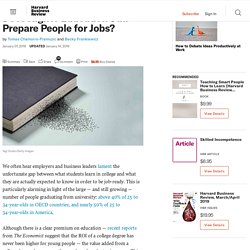
But as university qualifications become more commonplace, recruiters and employers will increasingly demand them, regardless of whether they are actually required for a specific job. Research shows that the correlation between education level and job performance is weak, and that intelligence scores are a much better indicator of job potential. If we were to pick between a candidate with a college degree and a candidate with a higher intelligence score, we could expect the latter to outperform the former in most jobs, particularly when those jobs require constant thinking and learning.
Having said that, universities could substantially increase the value of the college degree if they spent more time teaching their students critical soft skills. How the Value of Educational Credentials Is and Isn’t Changing. Executive Summary In the last decade, a popular narrative has emerged that the value of a college degree is rapidly declining.
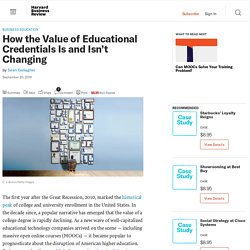
Why a candidate's 'experience' isn't everything during the hiring process. Why a candidate's 'experience' isn't everything during the hiring process Work experience is one of the first things hiring managers consider during the application process, as it provides a glimpse into the applicant's core strengths and general competencies.
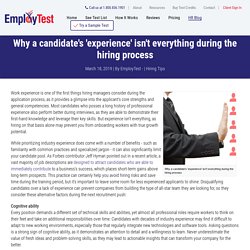
Most candidates who posses a long history of professional experience also perform better during interviews, as they are able to demonstrate their first-hand knowledge and leverage their key skills. But experience isn't everything, as hiring on that basis alone may prevent you from onboarding workers with true growth potential. Being Qualified Isn’t Good Enough In Today’s Job Market. Being qualified isn’t good enough anymore.
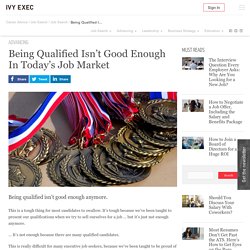
9 in 10 Singaporeans say job hours and workload different from what was promised at the interview: Glassdoor, Business Insider - Business Insider Singapore. 21st Century Country without a 21st Century work approach. Hours of work, overtime and rest day. Who is covered The hours of work guidelines apply only to those covered under Part IV of the Employment Act.
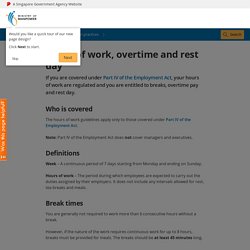
Note: Part IV of the Employment Act does not cover managers and executives. Definitions Week – A continuous period of 7 days starting from Monday and ending on Sunday. TODAYonline. SINGAPORE — Singaporeans are not only sleep deprived, but they are also among the most stressed at work globally, according to a survey by health service company Cigna released on Tuesday (Mar 26).
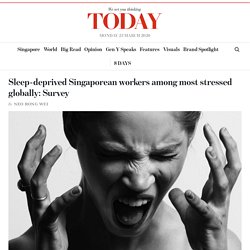
Nearly 92 per cent of Singaporeans surveyed were stressed from work, which was higher than the global average of 84 per cent. Of this group, 13 per cent said that the stress they faced was unmanageable. Singaporeans’ physical wellness index also dipped by 4.4 percentage points from last year, which the survey attributed to an increase in sleepless nights. Of the 23 markets surveyed, Singapore had the fifth lowest wellness index, which was measured across five key indices — family, financial, physical, social and work. 60% of Singaporean staff experience above average stress levels. Are Singaporean employers doing enough when it comes to health and well-being programmes?
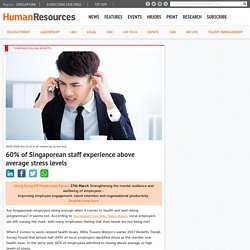
It seems not. According to new research from Willis Towers Watson, local employers are still missing the mark, with many employees feeling that their needs are not being met. When it comes to work-related health issues, Willis Towers Watson’s earlier 2017 Benefits Trends Survey found that almost half (44%) of local employers identified stress as the number one health issue. In the same vein, 60% of employees admitted to having above average or high levels of stress. Despite this, the survey revealed only 27% of employers are actually taking action to reduce work-related stress. Apart from work related stress, global findings revealed that stress can also arise from financial insecurity.
The Effects of Stress on Your Body. You’re sitting in traffic, late for an important meeting, watching the minutes tick away.
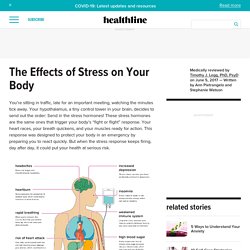
Your hypothalamus, a tiny control tower in your brain, decides to send out the order: Send in the stress hormones! These stress hormones are the same ones that trigger your body’s “fight or flight” response. How does stress impact our mental health? Stress is something everyone experiences.
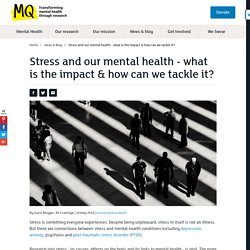
Despite being unpleasant, stress in itself is not an illness. But there are connections between stress and mental health conditions including depression, anxiety, psychosis and post-traumatic stress disorder (PTSD). Research into stress - its causes, effects on the body and its links to mental health - is vital. The more we understand stress, the better we can tackle it. In this blog, we explore the science of stress and mental health. Fight or flight Stress causes physical changes in the body. Long-term stress. Stress effects on the body. Musculoskeletal system When the body is stressed, muscles tense up.
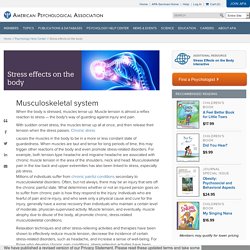
Muscle tension is almost a reflex reaction to stress — the body's way of guarding against injury and pain. With sudden onset stress, the muscles tense up all at once, and then release their tension when the stress passes. Chronic stress. 1. Form Positive Relationship. Building Positive Relationships at Work. Thanks to Joel’s coaching, I have grown revenues by 30 percent while improving employee retention and my personal job satisfaction. I was able to get a much sought after promotion and build relationships with key executives in my company. Joel helped me deal with situations from an honest, realistic standpoint and to focus on what really matters for my organization and myself. By adhering to my authentic goals and objectives, I’m able to achieve superior results while growing as a person.Kara Gilbert, Vice President, Sales,Oracle Corporation Building positive workplace relationships is vital for career success. 2. Start Being Physically Active / Exercising.
How to Start Exercising and Stick to It. 3. Eat Healthy and Nutritious Food. 7 Strategies for Cultivating Healthy Eating Habits. 4. Get Enough Sleep. Adopt Good Sleep Habits. Old Habits Die… Easily. 5. Prioritise and Organise. 27 Great Tips to Keep Your Life Organized. 6. Kick Your Bad Habits. 5 Ways to Kick Bad Habits.